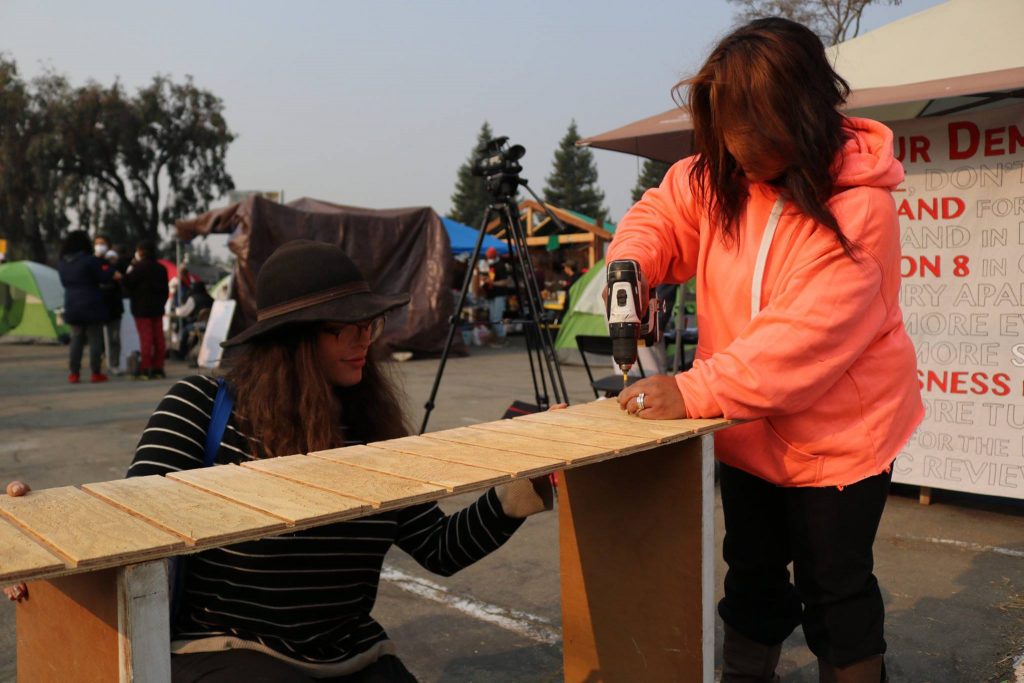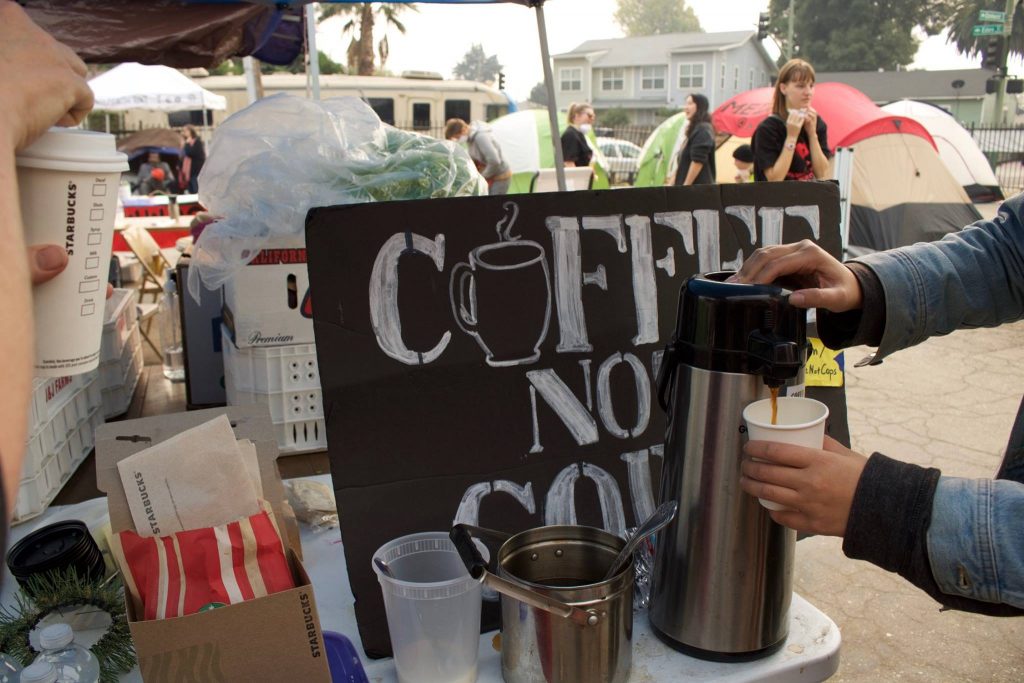
After months of negotiations, residents have moved back to the street—despite promises from city officials
“What do you have to say to my daughter?” Needa Bee screamed at the Oakland Department of Public Works employees who were tearing her home to the ground. “What do you have to say to my child? Where is she going to go?”
It was December 6, and Oakland Police officers had stormed Housing and Dignity Village—a homeless encampment for women of color and their children in East Oakland—to evict the residents who lived there. Just one day earlier, city officials had told residents that they would not force them to move until they could have a round table discussion with officials in the City Administrator’s office. That meeting never occurred.
The following describes the months leading up to the destruction of Housing and Dignity Village: How the community formed, resisted eviction, sued the city, and ended up back on the street.
Housing and Dignity Village (HDV) was formed by homeless people and their allies on in late October, built on a plot of city-owned land that has been vacant since 2008. Over the course of a weekend, they took the land, gathered tents, pallets, and plywood from neighbors and supporters, and built a home. There was a community kitchen, shared living space, and a medic’s tent stocked full of donated medical supplies. There were several tiny homes, either built by volunteers or donated by supporters. They lined up old tires and used them as planters—pouring in soil to grow a community garden.

It was a safe and sober living space for 13 individuals, most of them women and children. Residents often hosted community meals, in which they not only fed each other, but also residents of Brookfield—the low-income neighborhood where the encampment was located. According to Needa Bee—a program director at the Meiklejohn Civil Liberties Institute and a resident of HDV—said Housing and Dignity residents fed 500 people on Thanksgiving Day, both housed and unhoused.
“Me and my neighbors talk a lot, and none of us have a problem with [the encampment],” said Stephanie Blackmore, who lives in an apartment one block away from the vacant lot where the encampment sat. “There haven’t been any problems. It’s never loud, it doesn’t smell like weed when we walk by.”
But almost immediately after this community formed in East Oakland, the city attempted to remove it. They first received a notice to vacate for November 10, just two weeks after settling in the vacant parcel. But the residents did not want to leave. “We are houseless, but this is our home,” Needa Bee.
“We were doing something right and good here.”
To resist the notice to vacate, they filed a temporary restraining order against the city. Needa Bee, who has taken up a self-study of the law, drew up the restraining order herself to postpone the eviction. With the help of attorney Joshua Piovia-Scott, the residents also filed a civil rights lawsuit against the City of Oakland, Mayor Libby Schaaf, and Assistant City Administrator Joe Devries. The lawsuit claimed that evicting the residents would violate their 8th Amendment rights—a precedent set by the recent Martin v. Boise decision—as well as their 14th Amendment rights.
Their case was heard on November 13 in front of District Judge Haywood Gilliam in Oakland’s Ninth Circuit Court, less than a month after the encampment was founded. Ultimately, Judge Gilliam ruled that the residents of HDV did not have the right to remain on city-owned land indefinitely. By November 26, he had lifted their restraining order, saying that the city’s claim that it could provide shelter beds to each of the 13 residents disqualified them from the protections established in the Martin v. Boise decision. (The civil rights lawsuit is still pending.)
Disheartened, the residents braced themselves. It wasn’t long before they received their second notice to vacate, this time for December 5. That morning, homeless activists and their advocates showed up in force, and by the time the police and Public Works employees had arrived, more than 50 people had surrounded the fence around the encampment. The residents stayed inside, standing guard over their home.
City officials spoke with residents through the fence for five hours. Just before noon, they agreed to leave without evicting anyone.

“They said that there would be no eviction that day or the next day. That we’d have a meeting to negotiate,” said Candice Elder, Founder and CEO of the East Oakland Collective, a member-based community organizing group. “I said ‘okay so there will be no eviction? You’re all leaving?’ They said ‘yes.’”
The residents and their advocates erupted in applause. “I really appreciate it from the bottom of my heart,” HDV resident Ayana Johnson said as she addressed the crowd of supporters. “If the whole city did this, we wouldn’t be fighting about some little land. We’d all have something.”
Elder says she exchanged phone numbers with the city officials, and that the group planned to be in touch in the coming days. “We were under the assumption that the meeting would happen,” Elder said. “They made that promise to us. But it wasn’t really a promise they could make.”
But at 1:00 p.m. the following day, police stormed Housing and Dignity Village, and broke the lock on the gate surrounding it. Many of the residents weren’t there. Children were at school and adults were at work. No one had time to pack.
City officials were on the scene, observing the eviction from the sidelines. “There was no deal,” Councilmember Larry Reid’s assistant, Ray Leon, said as Public Works employees dismantled the encampment behind him. “We said we would ask Councilmember Reid and the City Administrator’s office if they were willing to negotiate, and they said no.”
The eviction process was slow. Department of Public Works employees were dismantling Housing and Dignity Village until midnight, throwing away tents, shoveling the dirt and flowers from the community garden into dump trucks and using drills to take the tiny homes apart, screw by screw.
As the eviction dragged on, a crowd gathered in protest.
“They were helping us so we could help ourselves and not die in the streets. Whatever I needed — a pair of socks, water,” Denise Draper, who sleeps in her car, yelled at police officers and city workers outside the fence as the encampment was being dismantled. “Anyone can become homeless at any time. You’re standing on your feet now. God will knock you down.”

At the end of the night, four residents of the Housing and Dignity community chained themselves to the inside of one of the tiny homes, and refused to move. Police had to remove them in handcuffs (ultimately, nobody was detained, and each of the residents were released onto the street.)
In the background, residents and supporters yelled loudly in protest. “We are all people. We bleed the same and our bones break the same. We were doing something right and good here,” said an HDV resident who wished to remain anonymous. “We are going to the street tonight.”
All of the encampment’s 13 residents are now either living in their cars, couch surfing, or back on the street.
“What the city was offering was inadequate. One of the shelter options was outside of Oakland, and that wasn’t going to work for most if not all of them.” said Elder. “One resident with a teenage child they were going to put up into a hotel for a few days until they could find him something. They were still looking for shelter that takes cats.”
Furthermore, Elder says that city officials explicitly stated that they were pushing other unhoused people off the waitlists for shelter beds to accommodate the residents of Housing and Dignity Village. “They refused. And rightfully so. They wanted to unify with other unhoused brothers and sisters, and not push people down the list.”
Alastair Boone is the Director of Street Spirit.
